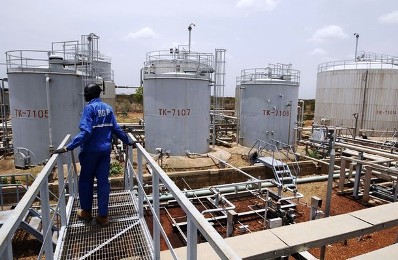Juba, Khartoum to discuss transitional financial arrangements: official
May 14, 2022 (JUBA) – South Sudan’s Finance minister, Agak Achuil Lual is in the Sudanese capital, Khartoum for discussions on the transitional financial arrangements between the two countries, a senior official told the Sudan Tribune on Saturday.
Lual was accompanied by security affairs advisor, Tutkew Gatlauk Manime.
“I tell you the financial situation is really bad and it will deteriorate if nothing is done urgently. Civil servants have not been paid. The army and security are not paid. Some ministers have abandoned using official cars because there is no money to maintain them. Our oil production has dropped,” said the source who preferred anonymity.
According to the official, 60 per cent of revenue from oil is taken by the consortium of the operating companies while the remaining portion goes into commitments like the transitional financial arrangements in Sudan.
“Some of the wells have been affected by the floods in Unity and Upper Nile states and the oil companies do not have technologies that drill oils in water. It is not in the contract [with Sudan]. This has affected production and whatever comes from the wells which are functioning is shared”.
South Sudan split from Sudan in 2011 after decades of a bloody civil war.
In August 2013, South Sudan agreed to pay Khartoum $9.10 and $11 for the oil produced in Upper Nile and Unity states respectively. Juba also agreed to pay the Transitional Financial Assistance (TFA) to the average of the agreed oil transportation fees.
South Sudan is demanding a temporary halt in payments to Sudan.
The South Sudanese delegation in Khartoum is also expected to discuss the possibilities of opening border crossings between the two nations.
Although no official statement was released on the visit to Khartoum, Manime told reporters it is a follow-up on progress in the implementation of the peace agreements in the two countries and to discuss issues of mutual concerns and joint cooperation in security, economic and political areas.
South Sudan earns income from less than half of the roughly 150,000 to 170,000 barrels of oil it produces in a day. The proceeds of around 55 to 60 per cent of the total oil output go to the three joint venture oil producers in the country, as profit and to cover their costs.
According to a recent United Nations panel of experts report, these costs are likely to include the contracts of the oil operating companies with security and other companies working in the oil fields, some of which are largely controlled by security officials and relatives of key government officials, a way to put their hands into off-budget funds.
South Sudan, where oil revenues make up nearly 98 per cent of the annual budget, has been reeling under economic crisis due to civil war.
(ST)

